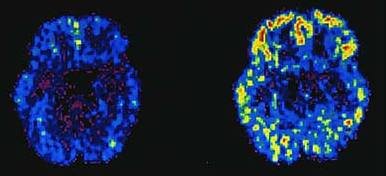Medication
Medication
Medications are used to treat the symptoms of mental disorders. They are called psychotropic or psychotherapeutic medications and they have transformed the lives of people with mental disorders for the better. Many people with mental disorders live fulfilling , productive, and successful lives with the help of these medications. Without them, they might suffer serious and disabling symptoms.
Effects:
Medications work differently for different people. Some people get great results from medications quickly and only need them for a short time. For others the effect may be slower to develop and they may also need to take medication for a much longer time.
PET scan of brain before and after medication for depression

When the medication starts working some of the effects can be perceived by some people. These include:
- Headache, which usually goes away within a few days.
- Nausea (feeling sick to your stomach), which usually goes away within a few days.
- Sleeplessness or drowsiness, which may happen during the first few weeks but then goes away. Sometimes the medication dose needs to be reduced or the time of day it is taken needs to be adjusted to help lessen these side effects.
- Agitation (feeling jittery) which improves after a few days.
These effects are an indication that the medication is working, and they wear off as the body gets adapted to the effect of the medication.
Some people may experience the effects a little differently from others and get worried that they are experiencing side effects. People taking psychotropic medicines need to follow their doctors’ directions. The medication should be taken in the right dose for the right amount of time. It can take three or four weeks until the medicine takes effect. Some people take the medications for a short time, and some people take them for much longer periods. People with long-term or severe depression may need to take medication for a long time.
Other (Side) Effects
Some people experience other (side) effects from medications and other people don’t. These include:
- Dry mouth
- Constipation.
- Bladder problems. It may be hard to empty the bladder, or the urine stream may not be as strong as usual. Older men with enlarged prostate conditions may be more affected.
- Sexual problems, which can affect both men and women and may include reduced sex drive, and problems having and enjoying sex.
- Blurred vision, which usually goes away quickly.
- Drowsiness.
- Dizziness when changing positions
- Blurred vision
- Rapid heartbeat
- Sensitivity to the sun
- Skin rashes
- Menstrual problems for women.
Most side effects show that the medicines are working and go away after a few days and often can be managed successfully. Doses producing side effects can be small or large, depending on the medication and the person. Factors that can affect how medications work in people include:
- Type of mental disorder, such as depression, anxiety, bipolar disorder, and schizophrenia
- Age, sex, and body size
- Physical illnesses
- Habits like smoking and drinking
- Liver and kidney function
- Genetics
- Other medications and herbal/vitamin supplements
- Diet
- Whether medications are taken as prescribed.
If a medication does not work, it is helpful to be open to trying another one.
Do not stop or self medicate:
Once a person is taking psychotropic medication, it is important not to stop taking them without the help of a doctor. Sometimes people taking psychotropics feel better and stop taking the medication too soon, and the symptoms may return. It’s important to give the body time to adjust to the change. People don’t get addicted, or “hooked,” on the medications, but stopping them abruptly can cause withdrawal symptoms. When it is time to stop the medication, the doctor will help the person slowly and safely decrease the dose.
